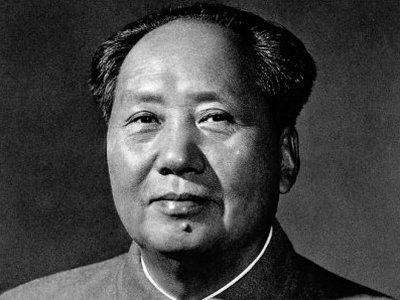
MAO ZEDONG – OR JESUS CHRIST – THOUGHT?
If we had to write what little we know of communist history, it would begin with Marx and Lenin, and continue in a line through Stalin and Khrushchev, centred on the Soviet Union and its satellites.
We’d likely forget Mao’s China in the west, which says a lot about our eurocentrism. But his impact was colossal and, unlike Soviet communism, it still endures. This is the thesis of Julia Lovell’s wonderful history, Maoism (Penguin, 2019), which more than any book before, has exhaustively analysed the impact of Mao Tse Tung on global politics. And it’s a malign story.
Where the Soviets delivered the Ukrainian famine, Mao’s Great Leap Forward led to the untimely death of between fifteen and thirty million people. While Stalin engineered his purges, Mao’s Cultural Revolution set society against itself - notably young against old, peasant against intellectual – producing a decade of misery and suffering.
But Mao had a greater global reach, perhaps as a result of the Chinese Communist Party attaining power just as anti-colonial struggles erupted following the end of world war. Analysts speak of China’s current expansion into Africa, but Maoist influence was huge there in previous decades. Many anti-imperial militias were taught how to wage Maoist guerrilla warfare against Africa’s European powers, including Zimbabwe, whose autocrat Robert Mugabe learned Mao’s playbook by heart, with repercussions that stretch ahead of us.
The anti-colonial ethic of Maoism gave it a cooler cache in western campuses and left-wing circles than its Soviet equivalent. Mao badges and posters symbolised rebellion, onto which people projected their aspirations without either awareness of, or regard for, the terrible suffering it inflicted elsewhere – notably in Cambodia and Peru.
Even today, Maoist ideology prevails in a long-running Naxalite insurgency against the Indian state and in Nepal, where Maoists have been in and out of power since intimidating the population to vote for it in the first place. Sanctioned political violence causes deep pain and in place after place Maoists, whose beliefs support impoverished and landless peasants, ensured this cohort suffered more than most as terror was inflicted on it in a tide of brutality that flowed alternately from the Maoists and lawless government counter-insurgents.
Among many influences that remain, two stand out for global politics. The first is the passion for ideological purity. This plays out in western thought today, beginning with the academy but having a much bigger reach. Class has been replaced by identity as the governing ethic. As we try and make sense of our multiple, sometimes fractured identities, we should strive to avoid the denunciations of those who think differently if we are to escape the clutches of Maoism. The bitterness sessions of the Cultural Revolution find an eerie, disembodied echo in some social media feeds. Tolerance of others would be a start; showing them love would be of God.
The other prevailing influence is modern China. The nation has global aspirations of leadership. It also has a premier, Xi Jinping, who has abolished the constitutional limit on his tenure that means he will rule for life. Xi has imposed ruthless party discipline and control, and rolled out an unparalleled surveillance system. His family suffered in the Cultural Revolution and he is wary of chaotic, grassroots unrest. In this way, he is Mao-lite. At least until we arrive at Xinjiang province, where the persecution and cultural genocide of Uighur life is worthy of Mao himself and likely to become one of the defining horrors of the early twenty-first century unless a way is found to stop it.
Communism as an economic model has long ceased, but continues as a system of government. Today’s existential question is whether the twenty-first century will belong to democratic or authoritarian government. Few seriously imagined this to be a relevant question as we entered the 2000s. Not anymore.
Lovell’s book is a timely reminder not just of the enduring relevance of Maoist themes, but of the Chinese Communist Party’s ideological influence – a capacity to project ideas across the world. We are left wondering and avidly praying for our Chinese Christian brothers and sisters. If – when – they obtain their desired freedoms, the rest of us will be blessed with their faith, enthusiasm and fresh insights into Jesus Christ. The true Great Helmsman.
POPULAR ARTICLES

Obama's Covert Wars
The use of drones is going to change warfare out of all recognition in the next decades.

Through A Glass Starkly
Images of traumatic incidents caught on mobile phone can be put to remarkable effect.

What Are British Values?
Is there a British identity and if so, what has shaped the values and institutions that form it?


